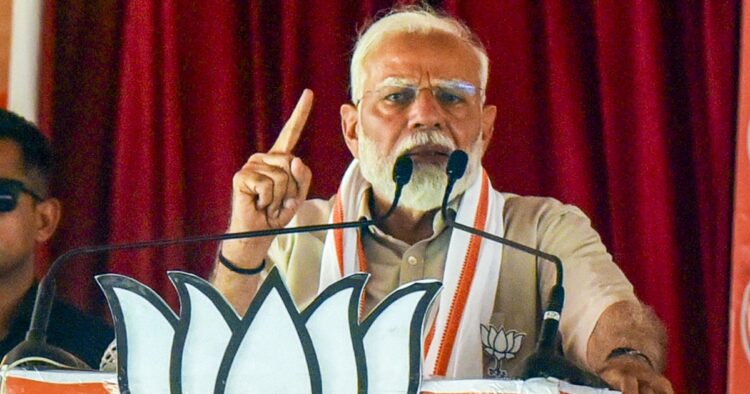Recently with Republic Media Network’s Editor-in-Chief Arnab Goswami, Prime Minister Narendra Modi issued a stern warning against the prospect of introducing reservation based on religion in Bharat. He emphasized that such a move would strike at the very core of the Indian Constitution, dubbing it as the “last nail in the soul of the Indian Constitution.”
PM Modi accused the opposition of playing divisive games under the guise of minority rights, particularly targeting the issue of Muslim quota. He likened their actions to those of a pickpocket, accusing them of attempting to change the constitution and inciting fear by alleging that “Modi will change Constitution.”
Moreover, PM Modi emphasized the broader implications of religion-based reservation on Bharat’s secular fabric. He argued that by introducing reservations on religious grounds, not only would secularism be undermined, but it would also lead to widespread concern and unrest in the nation.
PM Modi underscored that the framers of the Indian Constitution vehemently opposed the idea of religious reservations. He cited instances, such as in Karnataka, where the Congress allegedly tampered with OBC quotas to implement reservations for Muslims, accusing the Congress of using the Muslim quota issue for political gains.
Examining the constitutional perspective, the 1949 Constitution did not explicitly mention “minorities” in Article 296 but introduced provisions in Article 16(4) to enable reservation for underrepresented groups in government services.
The first constitutional amendment introduced Article 15(4), allowing for special provisions for socially and educationally backward classes, Scheduled Castes, and Scheduled Tribes.
Article 15 prohibits discrimination solely based on religion, caste, and other factors, with reservation seen as an extension of equality post the NM Thomas case. It emphasizes that if a group is deemed weak or backward, it can receive special provisions.
In addition, the inclusion of certain Muslim castes in reservations under the OBC category, without affecting quotas for SCs, STs, or OBCs, has been a precedent. The Mandal Commission furthered this approach by incorporating several Muslim castes in the OBC list, a principle upheld by the Supreme Court in the Indra Sawhney case.
PM Modi’s remarks come amidst a heated debate surrounding the issue of religious reservation, with implications not only for minority rights but also for the foundational principles of Bharat’s Constitution. The discussion underscores the need for a careful balance between affirmative action and preserving the secular ethos enshrined in the country’s founding document.

















Comments